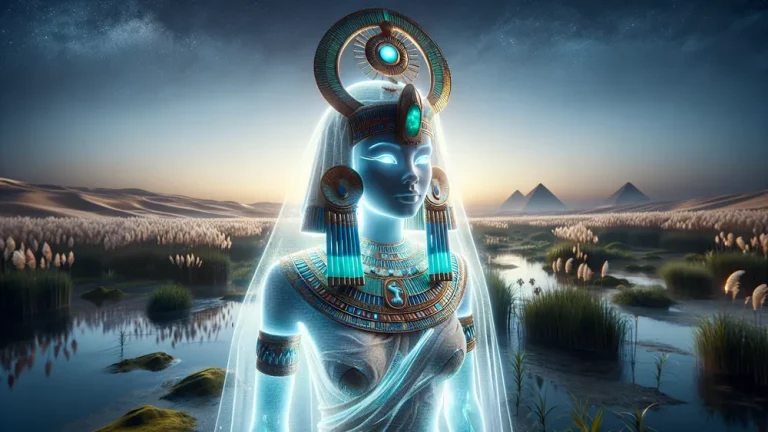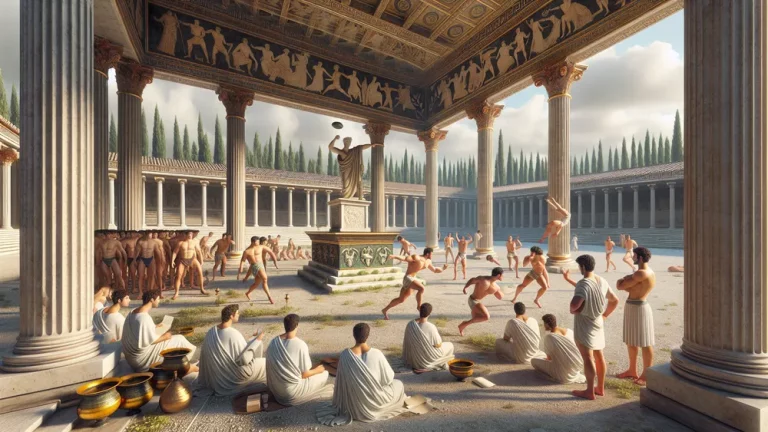Phobos: Greek God Of Fear And Son Of Ares And Aphrodite
In the large and complicated world of Greek stories, Phobos stands as a strong example of fear which comes from the mess of war and the feelings of love.
Key Points:
- Phobos is the Greek god of fear, son of Ares and Aphrodite.
- Phobos means fear or panic in Ancient Greek.
- In myths, he brings fear and panic, especially in battles.
- Known from the Iliad, he changes battles by causing fear.
- Twin brother Deimos stands for dread, often with Phobos.
- Worshiped in places like Sparta for his role in war.
- Phobos is a symbol of the natural, common fear in life.
When you learn about Phobos myths, you see he comes out as the child of Ares, the war god, and Aphrodite, the love goddess, his mythical origins mix parts of two of our most powerful feelings. This theme of love and war causes the idea of fear Phobos means – something deep in how people think.
Usually known as a dread deity, ancient fighters called on Phobos and wanted to scare enemies in battle, turning into the fear soldiers had themselves. He was not only superstition but took a big role in the Greek pantheon, being a clear picture of the scary, still normal, way people react to danger.
Throughout this look into Phobos, you find out how he influenced not just tales but also got into the running of society and daily life in ancient Greece, changing how fear was understood and respected.
Phobos: Overview and Key Facts
| Key Feature | Detail |
|---|---|
| Name | Phobos |
| Meaning | The name “Phobos” means fear or panic in Ancient Greek. |
| Parents | Child of Ares, god of war, and Aphrodite, goddess of love. |
| Siblings | Has Deimos (twin), Harmonia, Eros, and others. |
| Role in Myths | Means terror and fear, often used by fighters to cause panic in others. |
| Appearance | Art often has him seen as a fierce warrior or a shadow over fields of battle. |
| Notable Mention | Clearly appears in works like Homer’s “Iliad” where fear changes battles. |
| Worship | Respected deeply in Sparta with a spot for him, indicating his warlike value. |
| Twin Name | Deimos, who stands for dread or terror, closely linked to Phobos in stories. |
| Symbol | Means the raw, basic part of fear in human life. |
Where Phobos Came From
To really see Phobos’s part and why it matters in Greek stories, it’s important to look at his interesting family and start, which come from a joining of two of the pantheon’s famous gods. Indeed, let us dig a bit deeper into how Phobos comes out as he did and where his myths started, explaining his big place in old tales.
How Phobos Came to Be
Phobos, who was the old Greek fear god, comes from the joining of two big Olympian gods: Ares, who is the war god known for being fierce and aggressive, and Aphrodite, who is the love goddess famous for her looks and mastery over love ideas. This unusual pair draws a clear image of Phobos’s part, meaning the fear that grows from war mess and love trouble – two strong feelings that mix a lot in human life. But, like with many folks in Greek tales, views can change, with some stories giving other angles on his childhood or meaning. Quite importantly, the duality you see in today’s stories, where a person’s past hints at their battles or effects, can be seen here. Phobos’s family also shows the many outcomes of Ares and Aphrodite’s joining, including:

- Deimos: Tied to terror, he goes with Phobos in showing the thinking side of fighting.
- Harmonia: It means harmony and peace, and it stands against how Phobos means fear.
- Eros (Cupid): Known for romantic and erotic love, meaning the different feelings from their family.
- Anteros: This is the love god returned, which shows love’s complex and two-sided nature.
Thus, through these old links, Phobos acts as a main point for seeing how people of old Greece thought of and dealt with fear.
Phobos, born from Ares and Aphrodite, symbolizes fear arising from the chaos of war and the troubles of love, reflecting ancient Greek perspectives on fear and emotional complexity.
Phobos’ Job in Greek Stories
In Greek stories, Phobos’s main job is representing fear, standing with his father Ares on fields of fight. His being there is said to cause panic and terror among enemy soldiers, turning battles, which means old societies understood how fear could change how people fought wars.
This idea wasn’t just a thought but part of what soldiers felt, where how they emotionally were could mean who won. In writings like Homer’s “Iliad,” it describes Phobos as starting chaotic fear in soldiers’ minds, a key force in shifting battles.

However, stories tell of different gods with Ares, sometimes saying Phobos and his twin Deimos were there, while other times focusing on what they stood for. This shows how mixed up and non-linear myths can be, where figures can mean things and also be real in stories.
For old Greek fighters, thinking of Phobos was much like how today teams get ready before a big match, with each fighter getting set to face the battle by seeing fear right there. Therefore, Phobos’s job was two-fold: scaring the enemy badly, but also making his own side see and beat their fear.
Knowing about Phobos in these myths helps us understand how Greeks thought of fear, not just as something felt, but as a big part of war that needed mastering. This idea fits across many parts of history, where fear becomes both a tool and a reason for power, a duality embodied by Phobos’s part in old legends.
Side-by-Side with Deimos: Phobos’ Twin
In Greek stories, Phobos and Deimos are together as strong signs of war’s mental sides. As sons of Ares and Aphrodite, these two are unique and mean different parts of fear. Phobos being panic and running away, and Deimos meaning dread and terror.
Although they have these small differences, they are usually described together in books and pictures, like some story characters today that are paired to show opposite features, like anxiety and courage in story teams. Together beside Ares, Phobos and Deimos mean not only the war mess but also what it does to the mind and feelings.
These stories make people think about how fear appears in many ways and affects both the mind and the body together. While Phobos and Deimos have a similar base idea in fear and what it means, their roles in stories can go different ways depending on the story source.

Sometimes, Phobos can mean quick, sudden panic, like a sudden scare, whereas Deimos might mean a deeper, lasting dread, like how a storm feels coming. These different roles let writers look at how complex fear is in Greek tales, showing it has different sides. Like left and right hands doing different things, Phobos’s job of open panic fits with Deimos’s quiet, lasting presence.
By knowing their working together, readers see how the old Greeks used these figures to explain fear’s many parts and its strong hold on people.
| Part | Phobos | Deimos |
|---|---|---|
| Meaning | Being panic and running | Being dread and terror |
| Work with Ares | Partner to cause panic in fights | Partner to give lasting fear |
| Story Focus | Fast, clear reactions to fear | Deep, long fears |
| Art Views | Often pictured next to Ares and panic | Often pictured next to Ares and terror |
| Symbols | Means fast, body fear | Means fear about what’s to come |
Tales and Legends Featuring Phobos
To get a better knowledge about Phobos’s effect in Greek tales, we need to look at the stories he is in. This means his impact on different myth characters and events. Therefore, let’s go into the important myths where Phobos’s presence is greatest.
Phobos in the Iliad
In Homer’s big work, the “Iliad,” Phobos is always there on the battlefield. His job in these stories is to make the fear around his dad, Ares, bigger during fighting at Troy. With his brother Deimos, what Phobos does is both real and part of the story, being the scary fear that war brings to everyone in it.

Like how clouds come over a calm sea, Phobos in the “Iliad” means the growing dread that can upset soldiers and cause trouble. By being there, he means the mind games that go with fighting, explaining fear as something you can almost touch in this famous war story.
Homer’s “Iliad” puts Phobos as part of the gods running human things, which shows how soldiers’ fears were seen as what the gods wanted in old Greek ideas. Just saying Phobos’s name hints at the creeping dread that hits fighters on all sides, making things worse between Trojans and Greeks.
This fear was not just from weapons and plans, but also because gods played a part in their fate. Getting Phobos’s role in the story lets you see fear as a tool used not only by people but by gods wanting power in humans’ big struggles.
Reading Homer’s story, the times when Phobos’s impact on warriors is really strong are full of pictures – fighters stopping not at seeing blades, but because of fear of the gods. This explains fear as more than just a feeling; it’s a key player that changes the story just like heroes or bad guys do.
Phobos isn’t a character talking or doing things with a goal, but more of a force that connects with worries and doubts that fill the tale. His role in this key piece of Western writing gives a view on early thoughts of feelings, gods, and how those ideas mixed, sometimes harshly, with each other.
The Sparta Shrine for Phobos
In ancient Sparta’s harsh military life, the shrine for Phobos means they saw how important fear is in life and with gods. Spartans were known for their strict army rules, and they built this sacred place to use Phobos’s power, adding the deity into what they did before battles to make them brave by facing and managing fear.
This shrine means Sparta’s real approach to war. They knew that controlling emotions in fights is just as important as any combat skill. Like modern athletes thinking about getting through problems before games, they tried to turn phobos in rituals into power.

Not all rituals are known now, yet the shrine tells us how much they valued the psychological parts of war, showing how religion and daily tasks were deeply together in ancient days.
The Spartans built a shrine for Phobos to remind themselves that managing fear was as crucial as combat skills in war, reflecting their approach to warfare by integrating emotions into their religious practices and daily life.
How Phobos Affected Heroes and Rulers
In many Greek myths, Phobos has a critical role as a god of fear, and he changed the futures of heroes and rulers. His role was more than just being a symbol; he made key people feel great fear, which tested their bravery and strength.
For example, in the Trojan War, warriors on both sides spoke of the strong presence of Phobos, which blurred lines between our basic instincts and bravery. Some myths tell of heroes like Achilles looking into the eyes of this god, facing their own fears inside and outside.
This means Phobos was not just a constant threat but also a measure of character and power, similar to how real-world leaders handle big tests that check their strength. Also, Phobos’s effect reached rulers, whose choices were often changed by fear and anxiety. This was important to the Greek view of human emotions.
They thought calling on Phobos could change war and ruling, seeing emotions like fear as more than personal feelings, but as things that could affect everyone. Accepting fear as something real in making decisions reminds us how old stories can be like today’s ideas of leadership under stress.

Just as today’s leaders face quiet pressure from the public, ancient rulers dealt with Phobos’s shadowy presence, impacting their rule and kingdom’s future through his ghostly fear.
How Fear Shows Up in Culture
Fear is seen as Phobos and appears in many parts of old Greek life, meaning both its unavoidable nature and strong mental effects. In art, statues and pottery many times show Phobos in battle scenes, using his form to mean the clear tension and worry in soldiers’ minds. And in writing, old plays and stories talk about Phobos to make the drama of fights stronger, pointing out how fear is key in big moments and tough choices. Interestingly, in old finds, fear comes up again and again, much like how today’s movies use suspending themes to interest people. To see examples of these cultural depictions of fear through Phobos:
- Sculptures and Vases: Often show Phobos with Ares in war scenes, capturing the chaos and emotional turmoil of fighting.
- Classical Epics and Plays: Writers such as Homer and Euripides used Phobos to make the stories more tense, making fear a strong story piece.
- Religious Practices: Rituals with Phobos mean how fear shaped societal rules and religious acts, like modern ways of dealing with fear, such as by telling scary stories.
The Pantheon of Greek Mythology
The Greek gods include many different ones, each one showing parts of the natural world and our lives. This big group, it seems like a huge hierarchy, and Zeus is the leader. He works with other main gods like Poseidon and Hades. They each have their own areas, like the sea and the underworld.
Furthermore, there are other gods, demi-gods, and creatures that create a picture of old Greek beliefs. The order seems clear, but myths often vary, offering different family stories or godly actions, which reflect ancient Greek stories.
Moreover, anyone keen on all of these gods can see a full list with all Greek Gods for complete detail about each god’s role and place in this famous group.
FAQs
1. Who is Phobos in Greek mythology?
Phobos in Greek mythology is the personification of fear and terror, born to Ares, the god of war, and Aphrodite, the goddess of love.
2. How does Phobos relate to other Greek gods?
Phobos relates to other Greek gods as the son of Ares and Aphrodite, intertwining the divine aspects of war and love with the embodiment of fear.
3. What myths prominently feature Phobos?
Myths that prominently feature Phobos include the “Iliad,” where he appears alongside Ares to instill fear amidst the chaos of battle during the Trojan War.
4. How was Phobos worshipped in ancient Greece?
Phobos was worshipped in ancient Greece primarily through rituals and offerings at specific temples, such as the one in Sparta, where his influence as a deity of fear was acknowledged and revered by warriors seeking his protection in battle.







